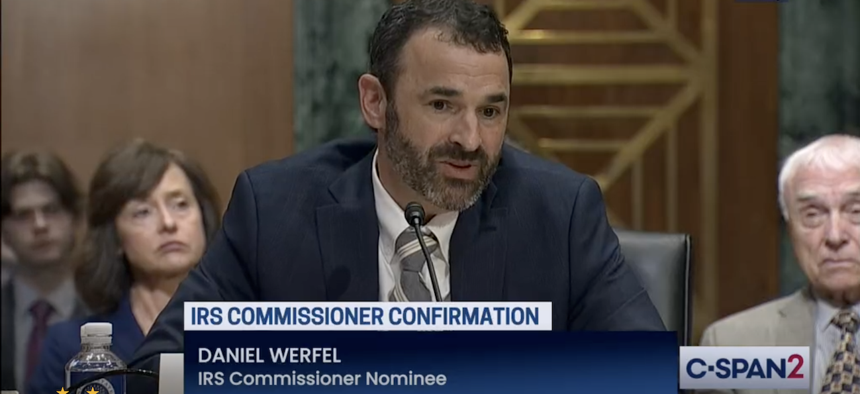
Danny Werfel, shown here testifying at his confirmation hearing on Feb. 15. He committed to addressing several issues, including public trust, audit disparities and tax return backlogs. Screengrab by GovExec
The IRS Has a New Commissioner After Senate Approves Biden's Pick in a Bipartisan Vote
"Government geek" Danny Werfel will lead the agency for a second time at a pivotal moment in IRS history.
The Senate on Thursday approved President Biden’s nominee to lead the Internal Revenue Service, confirming a new commissioner with vast federal experience who re-enters government at a historic moment for the tax agency.
Danny Werfel, a former acting IRS commissioner and Office of Management and Budget official under presidents in both parties, was approved on a bipartisan 54-42 vote. Six Republicans voted to confirm him, while one Democrat, Sen. Joe Manchin, W. Va., voted against him.
During his confirmation hearing, Werfel vowed to address chronic understaffing at IRS and said he would go about planning for those hires and other upcoming expenditures in a transparent and open way. Werfel will begin his new job just as the tax agency begins spending the $80 billion funding surge Congress provided it last year. IRS is expected to hire tens of thousands of employees with that funding, which Werfel stressed would help fill critical skills gaps that have hampered the agency’s ability to collect taxes.
Werfel said in his eight months temporarily leading IRS in 2013 amid a scandal at the agency, he drew inspiration from its workforce’s commitment to the “solemn duty” of its mission.
“I witnessed how dedicated and talented IRS civil servants are in fulfilling the critical mission of administering the nation’s tax system,” Werfel said last month. “Since leaving the IRS, I watched from afar how these employees navigated the challenges of historical underfunding and understaffing while providing economic lifelines to hundreds of millions of families and small businesses during the COVID-19 pandemic.”
While he pledged to help fill areas with shortfalls, he pushed back on reports IRS would use its new cash infusion to hire 87,000 enforcement agents who will target all Americans for increased audits.
“I think it’s patently incorrect,” Werfel said. Instead, he pledged to focus on hiring “people with the understanding and capacity and talent to unpack the complicated, intricate returns, which is a capacity gap that exists today.” Much of the hiring will go, and has already gone, to customer service representatives.
IRS was required to release a plan for spending its $80 billion over 10 years last month under a request from Treasury Secretary Janet Yellen, but it missed that deadline. Werfel said during his confirmation hearing he had played no role in drafting that plan, but pledged to several Republican lawmakers to allow for oversight of it.
“I really want to earn this committee's trust,” Werfel said. “As a former budgeteer, I think I will earn this committee's trust by putting together a very clear plan for where this money is going.”
Werfel noted that he learned the value of the civil service when he started his career in the 1990s in a General Schedule-9 position at OMB and promised to use his experience during the Deepwater Horizon oil spill, implementing the 2009 American Recovery and Reinvestment Act and leading IRS in his new role. Despite his time in government—he called himself “kind of a government geek”—Werfel in several instances said he wanted to get to IRS to learn how they are doing things before making any commitments to change.
Werfel will lead IRS as the agency serves as a flashpoint in the current divided government, as Republicans have repeatedly highlighted the upcoming IRS funding surge as the epitome of President Biden’s overreach. As its first legislative act in the 118th Congress, the new Republican majority in the House in a party-line vote approved a repeal of $71 billion in IRS funding. Werfel said he was given “a mandate from Congress” to implement the full funding and it was his job to ensure “that money is spent wisely.”







